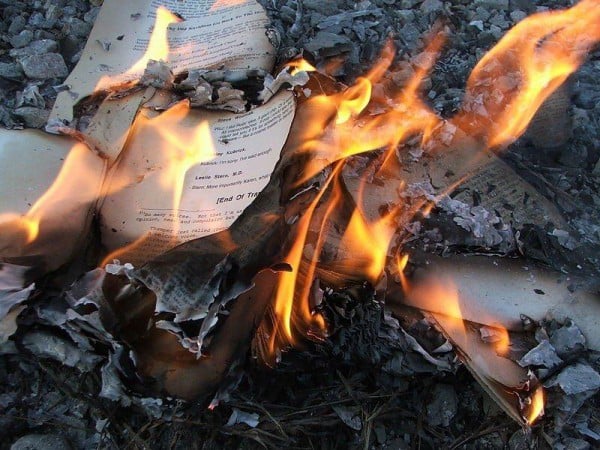
ISIS has launched a book looting and burning campaign throughout the northern Iraqi city of Mosul as part of its ongoing violent efforts to prevent the spread of any ideology that does not conform to its radical interpretation of Islam, CBS News reported.
News of the systematic ransacking of Iraqi libraries first emerged in January when the Associated Press reported that Islamic State fighters broke into and plundered Mosul’s Central Library. The militants loaded approximately 2,000 books into six waiting pick-up trucks, leaving behind only Islamic books. (Update: more destruction by ISIS continues—see ISIS Militants Storm Museum and Smash 3,000 Year Old Assyrian Sculptures on Video.)
According to residents a bearded fighter wearing traditional Afghan robes announced “These books promote infidelity and call for disobeying Allah. So they will be burned.” Various Iraqi media outlets have since reported that despite efforts from community leaders to stop the destruction, several public book burnings have been held in the streets.
Days later the jihadists broke into the University of Mosul’s library, burning hundreds of texts in front of students.
Speaking anonymously, a professor at the University of Mosul told the Associated Press that ISIS had already started the libricide in December of last year. He recounted the destruction of a Sunni Muslim library, damage to the Mosul Museum library which included manuscripts dating to 5,000 BC, and the vandalism of the archives of a 265-year-old Church and Monastary of the Dominican Fathers (see Threatened By ISIS, Monks Digitize Iraq’s Christian Heritage).
While most of the texts are presumed destroyed, the professor speculated that some rare, ancient manuscripts could find their way to the black market. The sale of cultural artifacts is an important revenue stream for ISIS (see Is ISIS Bankrolling Terrorist Activities with Stolen Antiquities? and UN Bans Export of Antiquities To Target Islamic State Revenue).
Meanwhile, the Iraqi politician Hakim al-Zamili reiterated the threat that ISIS posed to Iraq’s cultural identity and legacy. ISIS “considers culture, civilization and science as their fierce enemies,” he warned.